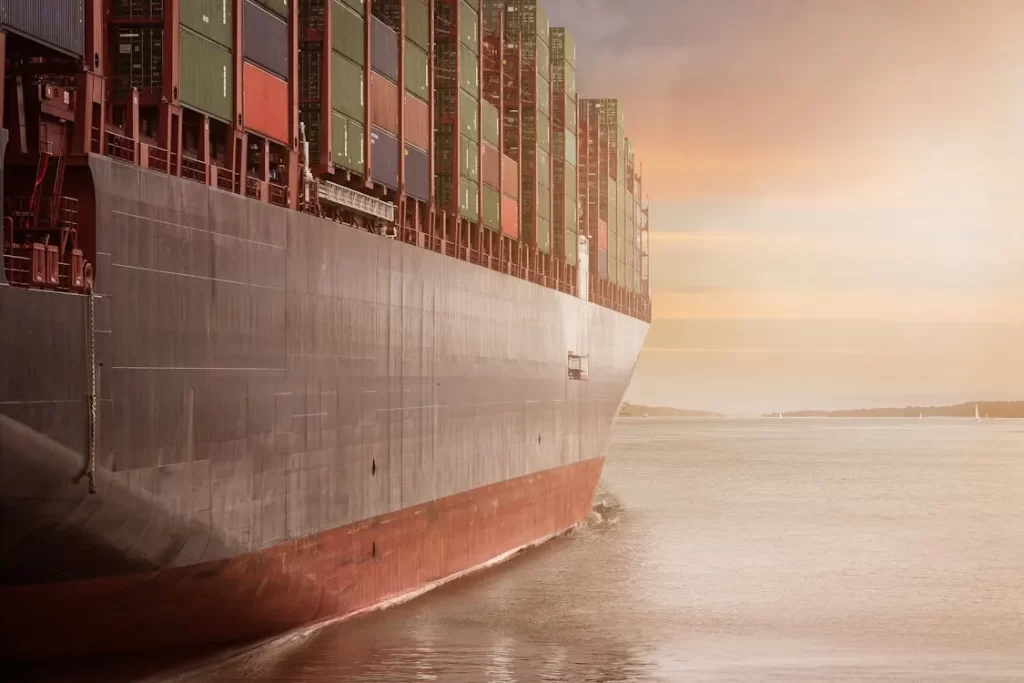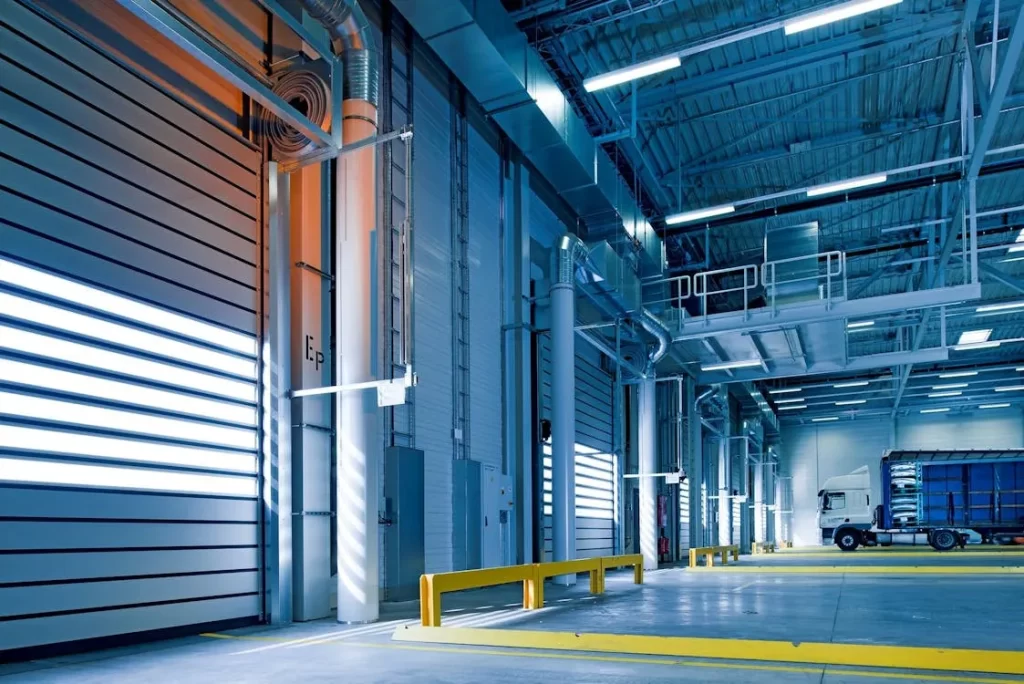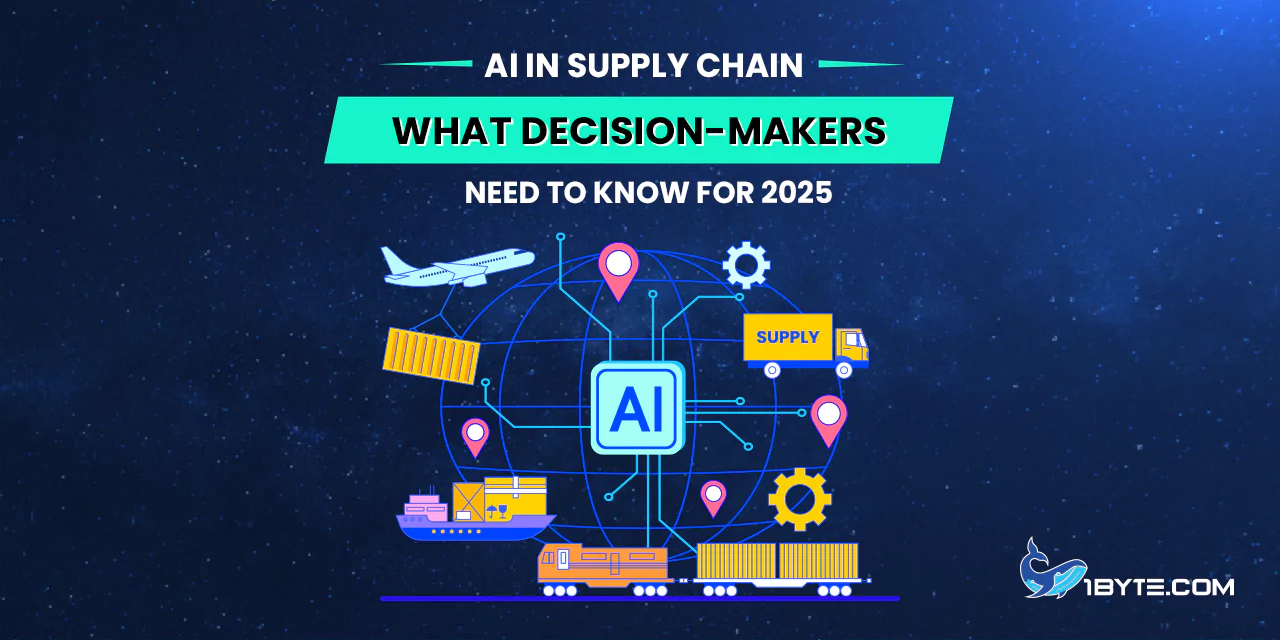Artificial intelligence is transforming supply chain operations worldwide. From predictive analytics to smart robotics, ai in supply chain initiatives are delivering new efficiencies, cost savings, and resilience across industries. Decision-makers are increasingly investing in these technologies to stay competitive in a volatile global market. This article explores the global rise of AI in supply chain management, key benefits backed by data, real-world company examples, and practical considerations for 2025 – all in a business-casual tone that any leader can understand. Read this article from 1Byte to find out more.
Global Rise of AI in Supply Chain Adoption and Trends
AI adoption in supply chain management has accelerated rapidly in recent years. Nearly half of supply chain leaders (46%) report they are already using AI in their operations today. This represents a significant jump from just a few years ago, highlighting how quickly AI has moved from pilot projects to mainstream use. Organizations are not only experimenting – they are scaling up. According to an industry survey, 74% of supply chain leaders are ramping up technology investments, and 90% plan to spend over $1 million on digital supply chain improvements in the next year. Much of this investment is flowing into AI and automation tools, making “ai in supply chain” a top strategic priority globally.

Several factors are driving this trend. Recent global disruptions – from the pandemic to geopolitical events – exposed vulnerabilities in traditional supply chains. Business leaders saw that AI-powered analytics and automation can improve agility and resilience during such shocks. For example, AI systems can analyze vast amounts of data (weather, geopolitical news, supplier info) to predict and mitigate supply chain risks faster than humans. The World Economic Forum has emphasized that adopting AI and advanced technologies is key to building more resilient, flexible supply chains for the future.
Emerging AI capabilities are also fueling adoption. In 2023-2024 everything with generative AI rose, which also offers new opportunities for supply chain management: from automating supplier communications creation to performing complex scenario planning. In fact, 70% of CEOs say that generative AI will sharply alter the way their company creates value and works. Still, this is an early trend: few, less than 20%, of operations and supply chain executives have actually rolled it out at scale. These cutting edge AI tools are being cautiously piloted, at least, in most organizations and sometimes even mature applications (for example, machine learning for forecasting or optimisations) already are delivering proven value.
Key Benefits and Impact of AI in Supply Chain Management
Looking at numerous organizations who are adopting AI into their supply chain, the question arise, why are they making this change? When it comes to the reasons, the answer is simple: AI offers tangible business benefits.For AI supply chain solutions, it can easily go through huge amounts of data and find patterns which are overlooked by humans, translating into smarter decision making and significant performance improvement. Here are some of the key benefits of ai in supply chain operations, backed by recent data and studies:
Demand Forecasting & Planning
Based on reading of historical sales, trends, and even external signals (weather, social cues, etc.), AI uses these data points to forecast demand with a level and accuracy much greater than humans are capable of. Companies can better stock the right products at the right places. For instance, through AI algorithms, Alibaba improved its demand forecasting accuracy by 40%, which saved the company in inventory costs and increased efficiency. For instance, owing to the adoption of machine learning on sales forecasting, Unilever’s demand planners were able to reduce the time they spend on data analysis by 50%, and at the same time saw a 20% improvement in the accuracy of their forecasts. These examples show how AI in supply chain planning prevents stockouts and excess inventory, directly improving sales and reducing waste.
Inventory Management & Optimization

With AI, inventory levels across warehouses and stores can be optimized with more accurate forecasts and real time analytics. Machine learning models find usage in recommending optimal stock levels, reorder points, and product allocation, by studying consumption patterns and lead times. Lower costs of holding and losses of sales are the results. For instance, Walmart has used AI to adjust its inventory to zero stockouts by 20% and minimum inventory on shelves. Companies can hold less ‘just in case’ inventory without running the risk of shortages, freeing up working capital, if they can predict demand shift early.
Logistics and Transportation Efficiency
In the logistics’ area AI is bringing huge improvements in route optimization, delivery scheduling and so on. Almost 40% of the supply chain executives mention that they have improved logistics and transportation functions through the use of AI. Using AI, we can route optimize traffic, weather and delivery windows to achieve the optimal routes for trucks and delivery vehicles. This yields substantial savings. This is proved by studies, which show that AI driven solutions will help to reduce transportation costs by 5–10%, we will be able to improve delivery reliability by 20%, and its total conveyance costs by 15%. Those percentage gains add up to millions of dollars saved and faster delivery times for customers of a global shipper or carrier. AI also speeds up the distribution process in the warehouses by optimizing picking and packing workflows.
Operational Efficiency & Cost Savings
Across supply chain activities, AI helps automate repetitive tasks, optimize resource usage, and eliminate inefficiencies. The result is higher productivity and lower operating costs. McKinsey research finds that supply chain and inventory management is the business area where companies most often report significant (>5%) revenue gains from AI initiatives. These gains come from things like better product availability (driving sales) and leaner operations (cutting costs). AI-powered automation in factories and warehouses can significantly boost throughput. Amazon, for instance, expects its new AI-enabled robotic fulfillment centers to see a 25% increase in productivity compared to traditional facilities. Even outside the warehouse, AI predictive maintenance on equipment can reduce downtime, while intelligent scheduling can increase labor productivity. All these improvements add up to a more efficient, cost-effective supply chain.
Supply Chain Resilience & Risk Management
One often overlooked benefit of ai in supply chain is improved resiliency. AI systems are able to monitor news across the globe and have insights into supplier data and real time transport conditions to provide potential areas of disruption. Early warning helps companies to proactively minimize risks (through procurement from a different supplier, re-routing of the shipping, or amending the orders). As anyone learns, being able to react quickly comes during a COVID 19 pandemic and other disruptions, allowing companies with AI-powered ‘control towers’ to quickly respond and stay open. Moreover, scenario planning (e.g. what if a port closes or one sees a surge in demand) is also helped by AI as decision makers can ask a ‘what if’ question and the AI model produces a supply chain impact simulation. This allows organizations to prepare contingency plans for handling volatilities. In short, AI provides end to end visibility helping to see the entire supply chain in fast time and making data driven decisions to make supply chains more agile and resilient to surprises.
Quality Control and Compliance
Computer vision is also improving and combined with advanced sensors, it is being used to improve quality assurance in supply chains. For example, the uses of AI image recognition include products on the line or to be shipped from a warehouse for defect and damage identification, guaranteeing quality. AI is also used by food and pharmaceutical companies to trace the products through the supply chain for safety and compliance. One case of it is Tyson Foods, which started using AI to track and provide transparency for products such that it reduced product recalls by 40% with less delays due to catching quality issues earlier and isolating affected batches. Improvements such as these cut costs of recalls, protect brand reputation and consumer safety.
These benefits demonstrate why ai in supply chain is a game-changer. Better forecasting leads to supply being at the right place, right time with the right products. The result is less expensive and faster delivery. They make employees free of boring routine work so that they can use their time for solving strategic problems. Better visibility of risk helps to avoid disrupting costly operations. Importantly, these gains affect the bottom line of all these directly through increased revenue, lower operational costs or both. This is no wonder as businesses around the world are not taking AI lightly and making it the backbone of their supply chain strategy.
Real-World Examples of AI in Supply Chain Operations

AI in supply chain management is not just theory – many leading companies are already seeing results. So let’s see a couple of examples in the real world from different industries. These cases illustrate how organizations large and small are leveraging ai in supply chain solutions, and the tangible benefits they’ve realized:
Amazon
Amazon, an e-commerce giant, heavily utilizes AI and Robotics in its supply chain. This year, Amazon has deployed over 750,000 systems from its proprietary picking and packing robots in fulfillment centers located around the globe. Using AI software, led by these robots work with human staff to hugely speed up the process of ordering. The newest generation warehouses of Amazon coming owing to AI advances is expected to be 25% more productive than traditional warehouses. Amazon’s inventory and delivery routes are also managed with AI algorithms, so that one day, same day deliveries are efficient. Amazon’s AI enabled supply chain is successful and on scale. This process assures that customers get fast delivery of products and Amazon conquers low per unit handling cost.
Walmart
From inventory management and demand forecasting across thousands of stores, the world’s largest retailer, Walmart, is dependent on AI. To adjust restocking plans at each location, Walmart uses machine learning models to predict the trends of sales. And by applying data this way, it has prevented some 20 percen¬t fewer stockouts, or empty shelves for customers, and also less excess inventory sitting in the ‘backroom.’ Walmart is employing AI powered robotics in the distribution centers that handle pallets and pretty much cases, with hopes of moving goods twice as fast as it used to. Computer vision is also used in the retailer’s fresh produce supply chain for instance, to reduce food waste by checking produce quality. Yet, all these efforts have borne results in the form of important savings and fresher and in stock products for shoppers.
UPS
With artificial intelligence, UPS optimizes delivery routes and increases shipping efficiency as a global logistics provider. ORION is UPS’s AI based platform that uses algorithms to determine the most efficient path for each delivery truck using map data, traffic and parcel information. By 2022, this AI route optimization had saved UPS an estimated 10 million miles of travel a year, fuel, and emissions. After implementing AI driven planning shapes UPS reported on the whole about 10 percent increase in delivery efficiency. Also, AI helps UPS predict a delay or bottleneck in the network. Potential problems (weather disruptions, facility overloads) are flagged by predictive models so that managers can reoute shipments or adjust staffing proactively. This brings about a more reliable delivery network and better customer service.
Maersk
In global shipping, Maersk is a leader in applying AI to streamline operations. The Danish shipping giant handles millions of container movements, and AI helps orchestrate this complex flow. Maersk developed AI systems to optimize vessel loading, port scheduling, and supply chain visibility for its clients. The company reported that its AI initiatives have improved operational efficiency by 25%, meaning ships spend less time idle and containers arrive on schedule more often. For example, AI algorithms optimize how containers are stowed on ships for faster unloading, and predict port congestion so routes can be adjusted proactively. These enhancements not only cut costs but also improve Maersk’s service reliability in the eyes of customers.
Alibaba
China’s e-commerce and logistics powerhouse Alibaba has infused AI into many parts of its supply chain. Alibaba’s Cainiao logistics network uses AI for demand forecasting, smart warehousing, and route planning to handle billions of orders, especially during peak events like Singles’ Day. By leveraging AI, Alibaba achieved a 40% improvement in demand forecasting accuracy, which significantly reduces excess inventory and ensures products are available for fast shipping. Alibaba’s smart warehouses feature AI-driven robots and automated sorting systems that can fulfill orders at blistering speeds – often processing an order from click to outbound shipment in mere minutes. On the delivery side, AI optimizes last-mile routes and even coordinates bicycle couriers and locker drop-offs in dense cities. This massive scale AI application enables Alibaba to promise rapid, 24-hour deliveries across China and handle surges in volume without disrupting the supply chain.
Unilever
As a global consumer goods manufacturer, Unilever has turned to AI to improve its supply and demand planning. Unilever implemented a machine learning-based forecasting system integrated with its planning software. This upgrade led to a forecast accuracy increase of up to 20% for certain product lines. Better forecasts allowed Unilever to reduce surplus inventory during promotions by about 30%, since they can predict the lift from a promotion more precisely and adjust production accordingly. Additionally, automating the data analysis process resulted in about a 50% improvement in the efficiency of demand planners’ work (they spend less time crunching numbers and more time on strategy). Unilever has also explored AI in its factories for scheduling production and in logistics for optimizing shipping routes between its manufacturing plants and distribution centers. These efforts help ensure that popular products (soaps, foods, cosmetics, etc.) are consistently available on store shelves while keeping costs in check.
All these examples are the instances of AI in use in different supply chain management contexts. They also underscore that success with ai in supply chain is not confined to one sector – retailers, logistics firms, manufacturers, and e-commerce companies are all harnessing AI. It is clear that the common thread is that companies who use AI effectively see material improvements in efficiency, cost and service level. These case studies inspire (and supply empirical data) decision makers with whom to build the business case for investing into AI.
Leverage 1Byte’s strong cloud computing expertise to boost your business in a big way
1Byte provides complete domain registration services that include dedicated support staff, educated customer care, reasonable costs, as well as a domain price search tool.
Elevate your online security with 1Byte's SSL Service. Unparalleled protection, seamless integration, and peace of mind for your digital journey.
No matter the cloud server package you pick, you can rely on 1Byte for dependability, privacy, security, and a stress-free experience that is essential for successful businesses.
Choosing us as your shared hosting provider allows you to get excellent value for your money while enjoying the same level of quality and functionality as more expensive options.
Through highly flexible programs, 1Byte's cutting-edge cloud hosting gives great solutions to small and medium-sized businesses faster, more securely, and at reduced costs.
Stay ahead of the competition with 1Byte's innovative WordPress hosting services. Our feature-rich plans and unmatched reliability ensure your website stands out and delivers an unforgettable user experience.
As an official AWS Partner, one of our primary responsibilities is to assist businesses in modernizing their operations and make the most of their journeys to the cloud with AWS.
Conclusion
As we head into 2025, AI has firmly established itself as an imperative for competitive, modern supply chain management. The examples and statistics highlighted above make it clear that ai in supply chain is not just an emerging trend – it’s here now, delivering real value. Companies leveraging AI are achieving more accurate forecasts, leaner inventories, faster shipping, and greater resilience amid disruptions. They are saving costs and delighting customers with better service. In contrast, organizations that lag in adopting AI risk falling behind their more efficient, data-driven rivals.
For decision-makers, the takeaway is that AI should be viewed as a strategic asset in supply chain operations. Leaders need to know not just the buzzwords, but the concrete opportunities AI offers and the steps to implement it successfully. This includes staying updated on the latest AI tools, fostering a data-savvy workforce, and continuously measuring impact. The good news is that technology is becoming more accessible – cloud-based AI solutions and user-friendly interfaces mean even mid-sized firms can start to capitalize on AI in their supply chains.
Looking ahead, we can expect AI to become even more embedded in supply chains globally. Analysts forecast the AI in supply chain market to grow by over 30% annually, reaching upwards of $20 billion in the next five years. Future advancements – from better algorithms to more IoT connectivity on the shop floor – will unlock new possibilities like self-optimizing supply networks and fully autonomous logistics. The organizations that begin laying the groundwork today will be the ones reaping the rewards tomorrow. In essence, embracing ai in supply chain is becoming essential for any business that wants to thrive in the dynamic, data-driven world of 2025 and beyond. By understanding the benefits, learning from real-world cases, and navigating the challenges thoughtfully, decision-makers can lead their companies to supply chain excellence in the AI era.

